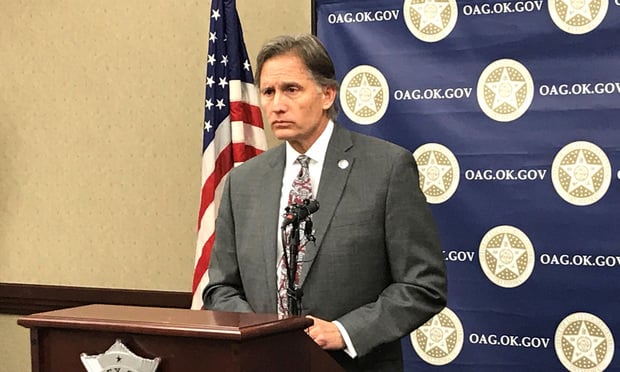Oklahoma AG Plans to Appeal $465M Opioid Judgment
Oklahoma Attorney General Mike Hunter appealed the opioid judgment after the judge refused to extend the abatement funds beyond a year.
November 21, 2019 at 02:44 PM
4 minute read
Oklahoma Attorney General Mike Hunter plans to appeal a $465 million opioid judgment after the judge refused to extend the abatement funds beyond a year.
The state joins Johnson & Johnson, sole defendant in the case, along with its subsidiary, Janssen Pharmaceuticals, in appealing the Nov. 15 judgment, which followed the first trial in the nation over the opioid crisis. At trial, the state's lawyers had argued for $17.5 billion paid out over 30 years to fix the opioid crisis in Oklahoma.
"During the trial, the state's expert witnesses repeatedly testified that it could take up to 30 years or more to take our state back to where we were before the crisis began," Hunter said in a statement Thursday. "All of these experts agree that there are dire consequences if we do not end the crisis in its entirety, and that it will get much worse and more Oklahomans will die. Johnson & Johnson had no abatement expert of its own and failed to present a competing abatement plan."
The state's appeal brief is due Dec. 16. Johnson & Johnson also has said it plans to appeal the judgment, which it said was "neither supported by the facts nor the law" and misapplied the claim of public nuisance.
"Today marks another procedural step on the way to appeal," wrote Johnson & Johnson attorney Sabrina Strong, a partner at O'Melveny & Myers in Los Angeles. "As was said when the judgment was announced, the company has very strong grounds to have this decision overturned. The company manufactured FDA-approved pain medicines, took steps to educate doctors so they could make informed treatment decisions with their patients, and trained their sales representatives to lawfully provide appropriate and accurate information to doctors."
Cleveland County District Court Judge Thad Balkman issued his original $572 million bench verdict Aug. 26.
"The opioid crisis is an imminent danger and a menace to Oklahomans," he said when rendering his verdict. Specifically, he said, Johnson & Johnson and Janssen created a nuisance that caused an increased rate of addiction, overdose deaths and addicted babies in Oklahoma.
In this month's final judgment, Balkman's total in abatement costs included $232.9 million for assessments for addiction treatment services and nearly $103.3 million for staff to administer pain-management therapies. The judgment also included an unspecified amount of attorney fees.
He reduced an original $107.7 million earmarked for evaluating babies born addicted to opioids to $107,700 due to a mathematical error.
In a press release, Hunter noted that the state "agrees with Judge Balkman's final order on a multitude of fronts," most significantly that Johnson & Johnson created a public nuisance in causing the opioid crisis in Oklahoma.
"However, we respectfully disagree with his order where it says Johnson & Johnson must only fund one year of cleaning up the public nuisance he found Johnson & Johnson created, after the company deceived and bombarded our doctors and Oklahomans with lies, leading to the deadliest manmade public health crisis in our nation's history," he said in a statement. "This limitation directly opposes evidence presented during trial and the state's public nuisance law, which requires full remediation of the problem."
He added support for Oklahoma Gov. Kevin Stitt, who, along with the state's two senior legislators, filed an Oct. 28 proposed amicus brief to clarify that Johnson & Johnson, and not the state's taxpayers, should continue to fund the abatement costs over several years. Johnson & Johnson, pointing to Balkman's conclusion that there were "gaps in the state's evidence" as to costs beyond one year, insisted that the payouts should be good for a year.
Balkman, however, disagreed with Johnson & Johnson that the judgment should be reduced based on $355 million in credits tied to settlements that the state negotiated with other defendants, Purdue Pharma and Teva Pharmaceuticals. Purdue settled out of the case in March for $270 million. One day before the May 28 trial, Teva agreed to pay $85 million, leaving Johnson & Johnson as the only defendant at trial.
This content has been archived. It is available through our partners, LexisNexis® and Bloomberg Law.
To view this content, please continue to their sites.
Not a Lexis Subscriber?
Subscribe Now
Not a Bloomberg Law Subscriber?
Subscribe Now
NOT FOR REPRINT
© 2025 ALM Global, LLC, All Rights Reserved. Request academic re-use from www.copyright.com. All other uses, submit a request to [email protected]. For more information visit Asset & Logo Licensing.
You Might Like
View All
4th Circuit Upholds Virginia Law Restricting Online Court Records Access
3 minute read
Plaintiffs Attorneys Awarded $113K on $1 Judgment in Noise Ordinance Dispute
4 minute read
Trump Administration Faces Legal Challenge Over EO Impacting Federal Workers
3 minute readTrending Stories
- 1Is It Time for Large UK Law Firms to Begin Taking Private Equity Investment?
- 2Federal Judge Pauses Trump Funding Freeze as Democratic AGs Launch Defensive Measure
- 3Class Action Litigator Tapped to Lead Shook, Hardy & Bacon's Houston Office
- 4Arizona Supreme Court Presses Pause on KPMG's Bid to Deliver Legal Services
- 5Bill Would Consolidate Antitrust Enforcement Under DOJ
Who Got The Work
J. Brugh Lower of Gibbons has entered an appearance for industrial equipment supplier Devco Corporation in a pending trademark infringement lawsuit. The suit, accusing the defendant of selling knock-off Graco products, was filed Dec. 18 in New Jersey District Court by Rivkin Radler on behalf of Graco Inc. and Graco Minnesota. The case, assigned to U.S. District Judge Zahid N. Quraishi, is 3:24-cv-11294, Graco Inc. et al v. Devco Corporation.
Who Got The Work
Rebecca Maller-Stein and Kent A. Yalowitz of Arnold & Porter Kaye Scholer have entered their appearances for Hanaco Venture Capital and its executives, Lior Prosor and David Frankel, in a pending securities lawsuit. The action, filed on Dec. 24 in New York Southern District Court by Zell, Aron & Co. on behalf of Goldeneye Advisors, accuses the defendants of negligently and fraudulently managing the plaintiff's $1 million investment. The case, assigned to U.S. District Judge Vernon S. Broderick, is 1:24-cv-09918, Goldeneye Advisors, LLC v. Hanaco Venture Capital, Ltd. et al.
Who Got The Work
Attorneys from A&O Shearman has stepped in as defense counsel for Toronto-Dominion Bank and other defendants in a pending securities class action. The suit, filed Dec. 11 in New York Southern District Court by Bleichmar Fonti & Auld, accuses the defendants of concealing the bank's 'pervasive' deficiencies in regards to its compliance with the Bank Secrecy Act and the quality of its anti-money laundering controls. The case, assigned to U.S. District Judge Arun Subramanian, is 1:24-cv-09445, Gonzalez v. The Toronto-Dominion Bank et al.
Who Got The Work
Crown Castle International, a Pennsylvania company providing shared communications infrastructure, has turned to Luke D. Wolf of Gordon Rees Scully Mansukhani to fend off a pending breach-of-contract lawsuit. The court action, filed Nov. 25 in Michigan Eastern District Court by Hooper Hathaway PC on behalf of The Town Residences LLC, accuses Crown Castle of failing to transfer approximately $30,000 in utility payments from T-Mobile in breach of a roof-top lease and assignment agreement. The case, assigned to U.S. District Judge Susan K. Declercq, is 2:24-cv-13131, The Town Residences LLC v. T-Mobile US, Inc. et al.
Who Got The Work
Wilfred P. Coronato and Daniel M. Schwartz of McCarter & English have stepped in as defense counsel to Electrolux Home Products Inc. in a pending product liability lawsuit. The court action, filed Nov. 26 in New York Eastern District Court by Poulos Lopiccolo PC and Nagel Rice LLP on behalf of David Stern, alleges that the defendant's refrigerators’ drawers and shelving repeatedly break and fall apart within months after purchase. The case, assigned to U.S. District Judge Joan M. Azrack, is 2:24-cv-08204, Stern v. Electrolux Home Products, Inc.
Featured Firms
Law Offices of Gary Martin Hays & Associates, P.C.
(470) 294-1674
Law Offices of Mark E. Salomone
(857) 444-6468
Smith & Hassler
(713) 739-1250










